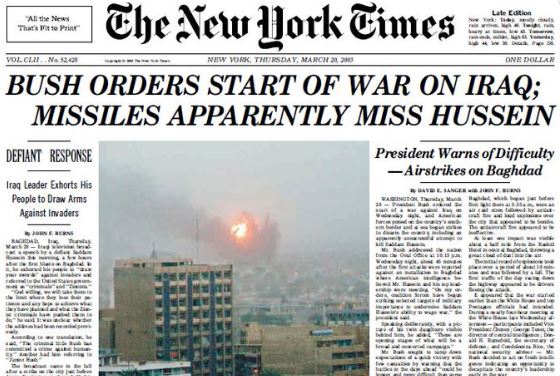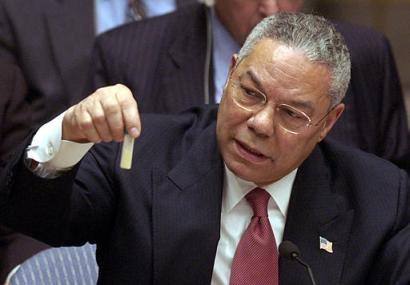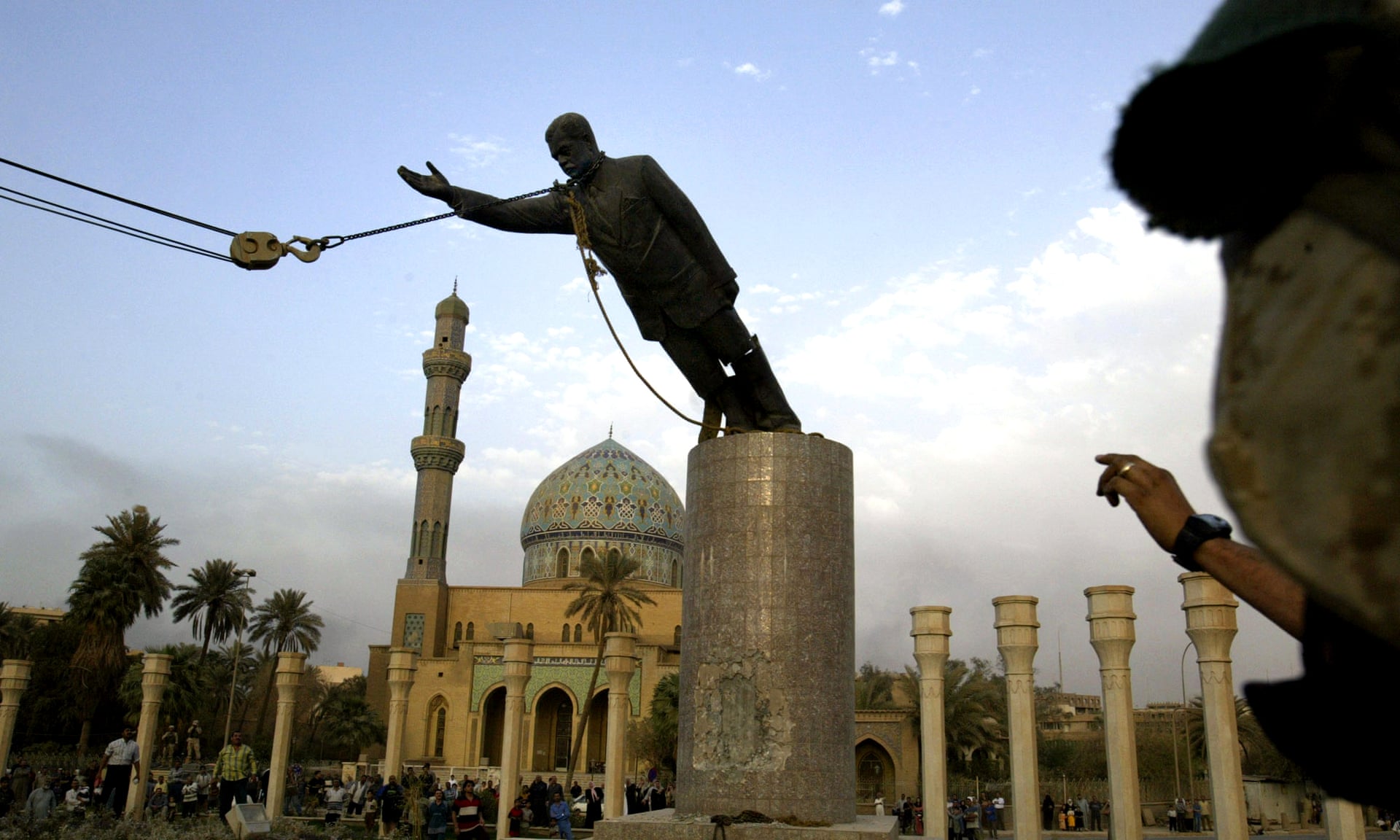by Mohammed Alnaqeeb, BGSU History major. This is one in a series of posts written by students in HIST 4800 in Spring, 2020, putting our world into historical context for the public.

assets/uploads/2003/03/Iraqwar.jpg)
Historical facts eventually come to light despite any mass media deception, but do we learn from history’s lessons? War is an extreme action that begets the most serious of consequences, it is not a decision to be taken lightly. Yet, time and again, people are fooled into thinking that war is the only alternative. A prime example of such a deception is the drive to convince the American people of one of the most unnecessary and calamitous conflicts in modern times and that is the 2003 Iraq War. This illegal war, that was supposed to bring freedom and liberty, plunged the whole of the Middle East into a bottomless pit of anarchy and chaos flowering into nightmares like ISIS. This pattern of deception, However, is neither unique nor isolated as it was practiced throughout history in almost every country and every war.
Animosity and confrontation were the name of the game in US-Iraqi relations since Iraq’s invasion of its neighboring oil-rich statelet of Kuwait in 1991. This was not Iraq’s first war as it had engaged previously in an eight-year conflict with its neighboring country, Iran (but that is another story). However, despite Iraq’s subsequent eviction from Kuwait by a US-led, world coalition of forces in Operation “Desert Storm”, relations with the US, remained fraught with mistrust and outright hostility.
President George W Bush, made the case for the war in his February 2003 speech to the American Enterprise Institute, when he stressed that “In Iraq, a dictator is building and hiding weapons that could enable him to dominate the Middle East and intimidate the civilized world —- and we will not allow it.” (https://www.theguardian.com/world/2003/feb/27/usa.iraq2). Although Iraq was not a docile democratic country, it was not by any stretch of the imagination a threat to world peace nor did it have any links to terrorism. Iraq was under the brutal totalitarian rule of its dictator, President Saddam Hussein, suffering gross human rights violations. The country (Iraq) was collapsing under a decade-long blockade and sanctions, disappearing middle class, a flight of its skilled professionals, no-fly zones, and frequent US aerial bombardments. The Iraqi army which according to the propaganda of the time was the fifth Army in the world actually consisted of poorly equipped and even poorly fed unmotivated conscripts. The American public was led to believe that this shell of a country was posing an existential threat to the United States (US) and World peace with its arsenal of Weapons of Mass Destruction (WMD) and its links to terrorism. No nuclear weapons, no chemical weapons, and no biological weapons were ever found, neither were any links to terrorism established, but why let facts stand in the way of a good war.
The whole war was basically based on lies, some of which were not even cleverly constructed and would not have stood to scrutiny, had they been challenged, alas “those who do not learn history’s lessons are bound to repeat it”. Months of concerted efforts by the Administration of President George H.W. Bush and the media succeeded in winning over the majority of the American public for the cause of war; “After all, the Bush administration had told them over and over that it was an act of self-preservation, for if we didn’t invade then, Saddam Hussein, who probably had something to do with Sept. 11, 2001, would attack us with his fearsome arsenal of weapons of mass destruction” (Paul Waldman, https://www.washingtonpost.com/opinions/2019/03/20/sixteen-years-ago-we-invaded-iraq-what-did-we-learn/). The case became so convincing to the American public that it was deemed unpatriotic for any individual to voice a dissenting opinion.

content/upcp20/2010/upcp20.v027.i01/10584600903502615/
production/images/large/upcp_a_450687_o_f0003g.jpeg
In his February 5, 2003 speech to the United Nations Security Council which lasted 76 minutes, Secretary of State Colin Powell tried to convince the International community of the case for war. claiming that Iraq was in possession of “biological weapons factories on wheels and on rails,” an “extensive clandestine network” to supply “its deadly biological and chemical weapons programs,” and the obtaining of “sufficient fissile material to produce a nuclear explosion ”this was according to Powell “facts and conclusions based on solid intelligence.” Powell also stressed Iraq’s strong ties and support for terrorist organizations. (for full text: February 5, 2003 speech to the United Nations Security

The claims of impending Armageddon if Iraq was not dealt with went even higher on the absurdity scale when the Secretary of State, Condoleezza Rice, informed us that “We don’t want the smoking gun to be a mushroom cloud”. This was based on documents that were “already been largely discounted by both the State Department and the CIA. The agency’s director told the White House three times not to use the claim because the CIA believed it to be false” (The Guardian). As former White House press secretary Scott McClellan put it “Bush and his White House were engaging in a carefully orchestrated campaign to shape and manipulate sources of public approval to our advantage.” His claim is supported by National Security declassified documents. According to the Archive’s briefing book No. 418, released on the 10th anniversary of the invasion, “the U.S. invasion of Iraq turned out to be a textbook case of flawed assumptions, wrong-headed intelligence, propaganda manipulation.” (The National Security Archive, George Washington University, https://nsarchive2.gwu.edu/NSAEBB/NSAEBB418/ ).
However, it was not only the usual suspects of neo-cons (neo-conservatives), Republicans or the administration that were pushing the war narrative. They were joined enthusiastically by the Democrats in misleading the American public. The Democrats at the time had the leadership of the Senate Intelligence, Armed Services, and Foreign Affairs Committees, but they did not blink an eye at the outright lies being used by the Administration in their drive for war. The previous democratic administration of President Clinton even paved the way by passing the “Iraq Liberation Act” in 1998, which declared that it should be US policy to seek regime change in Iraq.
The pressure to tow the official line for going to war and not rigorously checking the facts was felt by all the media outlets. After the occupation and months of rigorous search, it became clear that no WMDs existed and that leaders at the highest echelons of society and power were engaged in deceiving the nation. The New York Times’ infamous report from the editors to the readers included the following
“We have found a number of instances of coverage that was not as rigorous as it should have been. In some cases, information that was controversial then, and seems questionable now, was insufficiently qualified or allowed to stand unchallenged. Looking back, we wish we had been more aggressive in re-examining the claims as new evidence emerged—or failed to emerge.” (https://www.nytimes.com/2004/05/26/world/from-the-editors-the-times-and-iraq.html).

The American Public was convinced against its own better judgment that “this war was about peace” (President Bush), that somehow, occupation was in fact liberation and that death, destruction, and mayhem will flower into peace and democracy. Instead, the war sawed the seeds of violence and discontent. Where once resided an imaginary toothless monster, now is a hotbed for forces of darkness and chaos, where real monsters exist, and new ones born every day. Given the general public’s disdain and ignorance of its own history, we are bound to repeat the same mistakes. However, it is the mission of historians to cure such ignorance and apathy.

